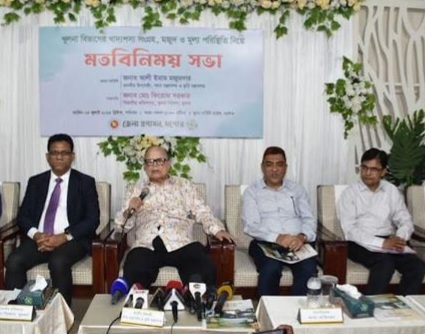
In response to the 37% tariff imposed by the Trump administration on Bangladesh’s export products, the government of Bangladesh will send two letters to the United States within the next 48 hours. This was confirmed by the Press Secretary of the Chief Advisor, Shafiqul Alam, during a briefing following a review meeting at the Ministry of Finance.
One letter will be addressed by Chief Advisor Prof Muhammad Yunus to US President Donald Trump, while the second will be sent by Bangladesh’s Finance Advisor to the US Trade Representative (USTR). The letters will outline the steps Bangladesh plans to take in response to the tariff issue, aiming to safeguard the country’s business interests and ensure a mutually beneficial trade relationship.
The review meeting, which took place from 3:30 PM to 5:00 PM on Sunday, was chaired by Finance Advisor Dr Salehuddin Ahmed and attended by four other advisors, business representatives, officials, and the Governor of Bangladesh Bank. The meeting also included discussions on the impact of the new tariff on the export sector and strategies for expanding trade.
According to Shafiqul Alam, the letters will highlight the government’s business-friendly approach and its plans to ensure that both nations benefit from enhanced trade. The focus will be on expanding Bangladesh’s business in the world’s largest market, the United States.
Plan of Action
In response to the US tariff, Bangladesh has devised a four-point action plan, as shared by the Finance Advisor: Expand trade relations between the US and Bangladesh, Strengthen the competitiveness of Bangladesh’s ready-made garment sector to outperform other competitors, Increase imports of not only products but also services from the United States and Eliminate both official and non-official non-tariff barriers in trade.
The Chief Advisor’s High Representative, Dr Khalilur Rahman, revealed that Bangladesh’s Ambassador to the US had recently discussed the matter with officials at the US Trade Representative’s office, where signs of alignment with Bangladesh’s approach were noted. Rahman hopes that the next 1-2 days will finalise the course of action.
Industry Perspectives
The Planning Advisor Dr Wahiduddin Mahmud emphasised the global impact of the tariff issue, noting that China and other major economies are also taking countermeasures. He expressed uncertainty about the potential outcomes but assured that Bangladesh would work to protect its key export sector, the garment industry, by focusing on improving productivity without cutting labor costs, which are already at their lowest.
Syed Nasim Manzur, a business representative, said that the steps being taken by the interim government have brought relief to the business community, signaling a clear action plan. He urged the government to explore other potential areas of trade with the US beyond garments, which remain Bangladesh’s largest export sector.









